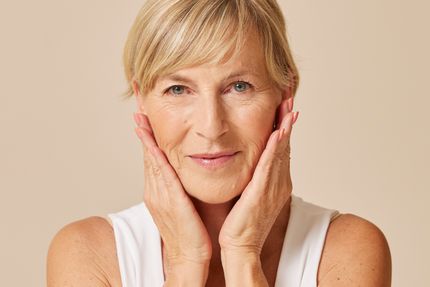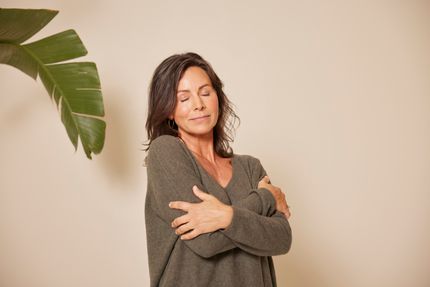Tingling sensations and menopause
Are you going through menopause and experiencing weird tingling sensations? It may not be the first thing that comes to mind, but yes, your hormones – oestrogen, in particular – could be to blame. What can you do about tingling in your hands, feet, legs or face? And what supplements can help with tingling sensations?

At first these tingling sensations didn’t really bother me. Until my limbs started to tingle at night to the point where I couldn’t sleep. That’s when I decided to get help. - Marinke (age 50)

Tingling, also called paraesthesia, is a symptom that occurs regularly in perimenopause. If tingling is the result of fluctuations in hormones, it usually stops when oestrogen levels stabilise after menopause, just like many other menopausal symptoms. It is not entirely known how many women experience paraesthesia during perimenopause or after menopause.
What is happening in your body?
Pins and needles, or tingling sensations in your body – often in hands, feet, arms, legs or face – can be the result of hormonal fluctuations during menopause. Hormone levels, in particular oestrogen, decline in the years leading up to menopause and your body has to adjust to a new hormonal balance. This can impact various processes, including the functioning of your nervous system.
Oestrogen helps protect nerve fibres and regulate blood flow. Falling oestrogen levels impact the central nervous system, producing symptoms like numbness, burning or tingling sensations throughout your body. You may feel pins and needles, or sensations of electric shocks, in your hands, legs or feet.
Tingling can also be caused by factors other than hormonal changes, such as a pinched nerve, medications (including hormone therapy), allergies, hernia, vitamin deficiencies or radiation therapy. It can also be a symptom of a disease, such as diabetes, Raynaud’s syndrome, multiple sclerosis, or it may be caused by an infection or migraine.
Do you experience persistent tingling?
Do you experience unusual burning or tingling sensations? If you don't notice any improvement despite adjusting your lifestyle, it's better to get professional help. This is especially important if these symptoms are hindering your everyday life or coincide with muscle loss, pain, changes in your vision, problems with walking and verbal expression, memory loss, muscle spasms, numbness throughout your body or fainting.
What can you do about these tingling sensations?
The best way to deal with tingling sensations is adapting your lifestyle and diet. You do not have to make big changes. Some women get good results by making one small change, such as going for a walk every day or taking a supplement. Here are some things you can try:
- Get plenty of rest. Tension and stress can cause your hormones to become even more unbalanced, making tingling sensations worse. Find ways to release tension by taking more breaks, setting priorities, doing things that you find relaxing (or don't do anything for a while). Hormonal fluctuations during menopause make you more sensitive to stress. Accept that your pace of doing things is somewhat slower than it used to be.
- Eat sufficient healthy fats, vegetables and fruit. Fat is the starting material for hormones. Therefore, it’s crucial to include healthy fats in your diet. Fatty fish, flax seeds, walnuts and olive oil are good sources of healthy fats. A varied and balanced diet should also include lots of fruit and vegetables. Fruit and vegetables are rich in fibre, as well as vitamins and minerals.
- Try to avoid unhealthy habits. Like smoking and excessive alcohol consumption. Nicotine and alcohol affect the central nervous system and other bodily functions.
- Exercise daily. Exercise improves blood circulation and heart function, and reduces tension and stress. Try to get at least 30 minutes of physical activity a day in addition to your normal activities. Stretching is good for blood flow and can help relieve pain from a pinched nerve.
- Move around. Do you have a sedentary job? Make sure you get up from your desk and walk around throughout the day to stimulate blood flow. Did you know that you can burn twice as many calories by swapping sitting for standing?
- Supplements can support your health. Take, for instance, Vitamin B12, iron, magnesium, Solgar® Rhodiola Root, Woman Multiple and MenoPrime. Bear in mind that supplements need a few months before they give noticeable results.
- See your GP if the tingling doesn’t clear up. If tingling sensations persist or worsen, it's advisable to seek medical advice. It could be a sign of an injury or condition.
Your path to a smooth menopause starts here
Get the tools you need to navigate menopause with more ease and to educate yourself about your body. With tips and insights from experts, and relatable stories of women just like you. Press play, not pause.
What treatments can help?
The best way to deal with tingling sensations is adapting your lifestyle and diet. Many women notice improvements by taking daily walks and making sure their diet includes the right nutrients and building blocks. Supplements can complement your diet and help fill any gaps.
Can hormone therapy help?
Hormone replacement therapy (HRT) replaces female sex hormones, such as oestrogen, which a woman's body stops making due to menopause. HRT can be an effective way to treat severe symptoms that get in the way of your daily functioning, such as hot flashes and vaginal dryness. If you're also suffering from other symptoms besides tingling, then hormone therapy might be an option for you.
Sources
- Boulware MI, Mermelstein PG. (2005). The influence of estradiol on nervous system function. PMID: 16491165.
- National Institutes of Health. (2015). Numbness and tingling. https://medlineplus.gov/ency/article/003206.htm
- Mayo Foundation for Medical Education and Research. (2024). Estradiol (Transdermal Route). https://www.mayoclinic.org/drugs-supplements/estradiol-transdermal-route/description/drg-20075306.
- Mukherjee S. (2013). Alcoholism and its effects on the central nervous system. PMID: 23713737.
- Liu T, Healthnews. (2023). Ways to Treat Tingling Sensation in Hands and Feet During Menopause
Tips and advice


FAQ
Are tingles in your face, hands, feet or legs dangerous?
If the tingling sensations in your face, hands, feet or legs are caused by hormone fluctuations, it usually doesn't hurt. Once your hormones rebalance once menopause has passed, the sensations or dormant feeling often go away on their own. Consult a GP to find out what the underlying cause is.












